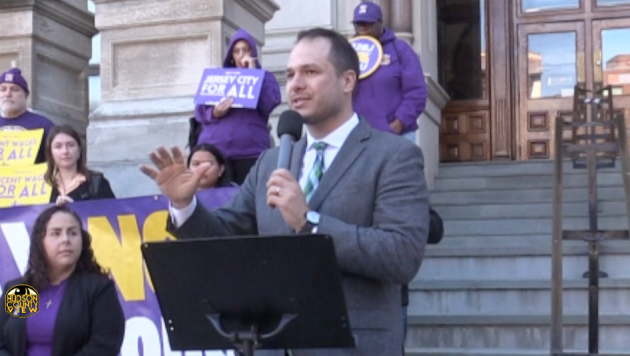In an editorial, Knitty Gritty JC member Arlene Stein explains why she believes Jersey City Ward E Councilman James Solomon has the best approach for development if elected mayor. 
Jersey City has been on a building tear. Cranes dot Journal Square and Paulus Hook, and our skyline keeps getting taller.
But there’s an uncomfortable truth beneath the shine: we’ve financed much of this boom with tax abatements and long-term “Payments in Lieu of Taxes” (PILOTs) that pad developer profits while shortchanging public schools and shifting the burden to everyone else.
That’s why I’m supporting Councilman James Solomon for mayor. He’s the only leading candidate who has consistently opposed bad abatements and is promising a top-to-bottom audit of every developer tax break on the books.
Consider last week’s vote for a 30-year PILOT in Paulus Hook. It’s the same abatement story we’ve always had in Jersey City: long horizon for our taxpayers, limited fiscal upside for schools, and the age-old story of private gain now, public costs later.
Here’s why this matters. Under New Jersey’s PILOT structure, 95% of the payment goes to the city and 5% to the county. Zero goes to the public schools.
With a conventional property-tax bill, schools receive a substantial share. With a PILOT, they don’t. For a school district already asked to do more with less, that’s not development policy; it’s a shell game.
Who makes up the difference? Homeowners and small landlords without abatements—people who’ve watched bills spike while new luxury towers get decades of discounts.
I know this firsthand. My property taxes, for a modest house in the Heights, have more than doubled during the past several years.
Meanwhile, large projects negotiated generous breaks for barely anything in return. That’s not smart growth; it’s upside-down budgeting.
Supporters of blanket abatements argue that “the project wouldn’t happen otherwise.” Sometimes, in weaker markets or on contaminated sites, that’s true.
But that’s supposed to be the exception, not the rule. New Jersey’s own transit-oriented development guidance says PILOTs are meant for projects in designated zones, with a clear showing that the deal is necessary.
In the hottest corners of Jersey City, the idea that 30-year subsidies are the only way to build strains credulity.
James Solomon is offering a different path. First, as mayor he’s vowed to audit every developer tax break, past and present, and publish the results.
Sunlight is the precondition for reform; residents deserve to see which projects paid what, and whether promises on affordability and community benefits were delivered.
Second, Solomon would stop handing out long-term abatements as a default and tie any incentive to clear, measurable public benefits—deeply affordable homes, not token set-asides; enforceable labor standards; real neighborhood amenities.
If an abatement doesn’t pass a rigorous cost-benefit test for schools and taxpayers, it shouldn’t pass at City Hall. (And yes, that means clawbacks when developers miss their marks.)
Third, he’s right to center school funding in the conversation. Every time the Council swaps a full tax bill for a PILOT, JCPS loses revenue it would otherwise receive.
We can’t keep telling families we value education while structuring deals that route school dollars away from classrooms. If we need incentives in specific places, build in a dedicated school share of any service charge—full stop.
Some will reply that the Paulus Hook deal included “affordable” units, union labor, or new walkways—as if any benefit automatically justifies a 30-year discount. But terms matter.
The public should see the math: how many affordable homes, at what income levels, for how long, and what’s the net present value to the city and the schools compared to a conventional tax bill?
Without those answers, “affordable” becomes a press-release adjective, not a policy.
This election is about whether Jersey City continues governing by developer exception—or resets to fairness and transparency.
Voters should use that opportunity to demand a course correction: end automatic abatements, publish the books, and put schools and homeowners first.
For years, too many leaders sold us a false choice: accept endless abatements or accept no growth. James Solomon rejects that binary.
Build, yes—but build on terms that make sense for the people who already live here and pay the bills. If you’re tired of “gold-plated” deals and rising tax notices, it’s time to back the candidate who’s been “not for sale” from the start.
Vote James Solomon for mayor on November 4. Let’s grow Jersey City without giving away the store.
Arlene Stein is an educator and a resident of Jersey City Heights. She is also on the organizing committee of Knitty Gritty JC, a local pro-democracy group.